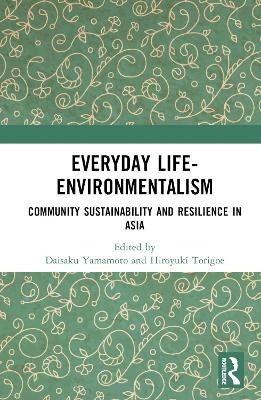
Everyday Life-Environmentalism
Routledge (Verlag)
978-1-032-02751-7 (ISBN)
Life-environmentalism offers a lens through which the agency of small communities in sustaining their everyday life and living environment can be understood. The book provides an overview of this approach, including intellectual backgrounds and foundational concepts, along with a variety of empirical case studies that examine environmental and sustainability issues in Japan and other parts of Asia. It also includes critical reflections on the approach in light of contemporary sustainability challenges. The empirical topics covered in the book include local community responses to development projects, resource governance, disaster response and recovery, and historical environmental preservation. The chapters are contributed by researchers working at the forefront of the field. It provides only a glimpse into the vast literature that awaits further exploration and engagement in the future.
The book is suitable for upper undergraduate students, graduate students, and researchers interested in environmental problems, sustainability and resilience, disaster mitigation and response, and regional development in Asian contexts, particularly Japan. It is well-suited for courses in anthropology, geography, sociology, urban and regional planning, political science, Asian studies, and environmental studies.
Daisaku Yamamoto is Associate Professor of Geography and Asian Studies at Colgate University, U.S.A. He holds a PhD in Geography from the University of Minnesota. His recent published works include: Unravelling the Fukushima Disaster (2016) and Rebuilding Fukushima (2017) (co-edited with Mitsuo Yamakawa); “Nuclear-to-Nature Land Conversion” (Geographical Review, 2020); “Cursed Forever? Exploring Socio-Economic Effects of Nuclear Power Plant Closures Across Nine Communities in the United States” (Geoforum, 2022). Hiroyuki Torigoe is Professor at Otemae University, Japan, specialized in environmental sociology and folk cultural studies. He holds a PhD from the Tokyo University of Education, and has taught at Kwansei Gakuin University, the University of Tsukuba, and Waseda University. He was the President of the Japan Sociology Society and the President of Otemae University. He is best known for his pioneering work on life-environmentalism based on his extensive fieldwork in Japan and overseas. He has published over 20 single-authored books, 17 co-authored or edited books, and numerous articles.
1. Introduction
Daisaku Yamamoto
2. Theorizing Everyday Life: The Life-Environmentalist Way
Daisaku Yamamoto
Part I: Developmental Impulse and Everyday-Life Organizations
3. Local Rules: Sustaining Local Everyday Life with Aqua-Tourism
Takehito Noda
4. Coexistence without Consensus: The Role of a Life Organization in Mediating between Fishermen and Surfers in a Coastal Community
Shusuke Murata
5. When Civil Society Falls Short: Rural Community Response to a Resort Development Project
Daisaku Yamamoto and Yumiko Yamamoto
Part II: Governing Everyday-Life Spaces
6. From Dichotomous Interpretations to Spectrum Thinking: Formation of a Community Organization in a Nuclear Host Locality
Atsushi Yamamuro
7. “Public” (gong) as Village Norm: Urbanization and Community Response in China
Meifang Yan
8. Multilayered Commons Space: Dry Riverbed Use in a Local Community in Ibaraki, Japan
Takaaki Isogawa
Part III: Living with Disasters
9. Why Do Victims of Tsunami Return to the Coast?
Kyoko Ueda and Hiroyuki Torigoe
10. The Roots of Resilience: Forest Commons and the Cultivation and Disappearance of Livelihood Security in a Nuclear Disaster-Afflicted Community
Hiroyuki Kaneko
11. Apparitions and the Recovery of Livelihoods after the 2011 Tōhoku Earthquake and Tsunami Disaster
Kiyoshi Kanebishi
Part IV: Historic Environment and Urban Communities
12. Living Traditional Culture: Gujo Dance in Hachiman Town, Gujo City, Gifu Prefecture, Japan
Shigekazu Adachi
13. Embracing the Enemy’s Legacy: Historical Environmental Preservation in Daegu, South Korea
Rie Matsui
14. Boxing Camp as a Community School: Local Boxers in Metro Manila, Philippines
Tomonori Ishioka
Part V: Critical Reflections and Prospects
15. Empirically Speaking: Life-Environmentalism, Environmental Justice and Feminist Political Ecology
Daisaku Yamamoto, Sophia Ferrero, and Keegan Kessler
16. Life-Environmentalism, Critiques, and Prospects: Focusing on the Experientialist Approach
Yasushi Arakawa
17. The Future of Life-Environmentalism: A Sympathetic Critique
Masaharu Matsumura
Part VI: Translated Excerpts from Sociological Theory of Environmental Problems (1989)
18. Original Introduction of Life-Environmentalism (1989)
Hiroyuki Torigoe
| Erscheinungsdatum | 07.12.2023 |
|---|---|
| Zusatzinfo | 1 Tables, black and white; 20 Line drawings, black and white; 21 Halftones, black and white; 41 Illustrations, black and white |
| Verlagsort | London |
| Sprache | englisch |
| Maße | 156 x 234 mm |
| Gewicht | 780 g |
| Themenwelt | Naturwissenschaften ► Biologie ► Ökologie / Naturschutz |
| Naturwissenschaften ► Geowissenschaften ► Geografie / Kartografie | |
| Technik ► Umwelttechnik / Biotechnologie | |
| ISBN-10 | 1-032-02751-7 / 1032027517 |
| ISBN-13 | 978-1-032-02751-7 / 9781032027517 |
| Zustand | Neuware |
| Haben Sie eine Frage zum Produkt? |
aus dem Bereich


